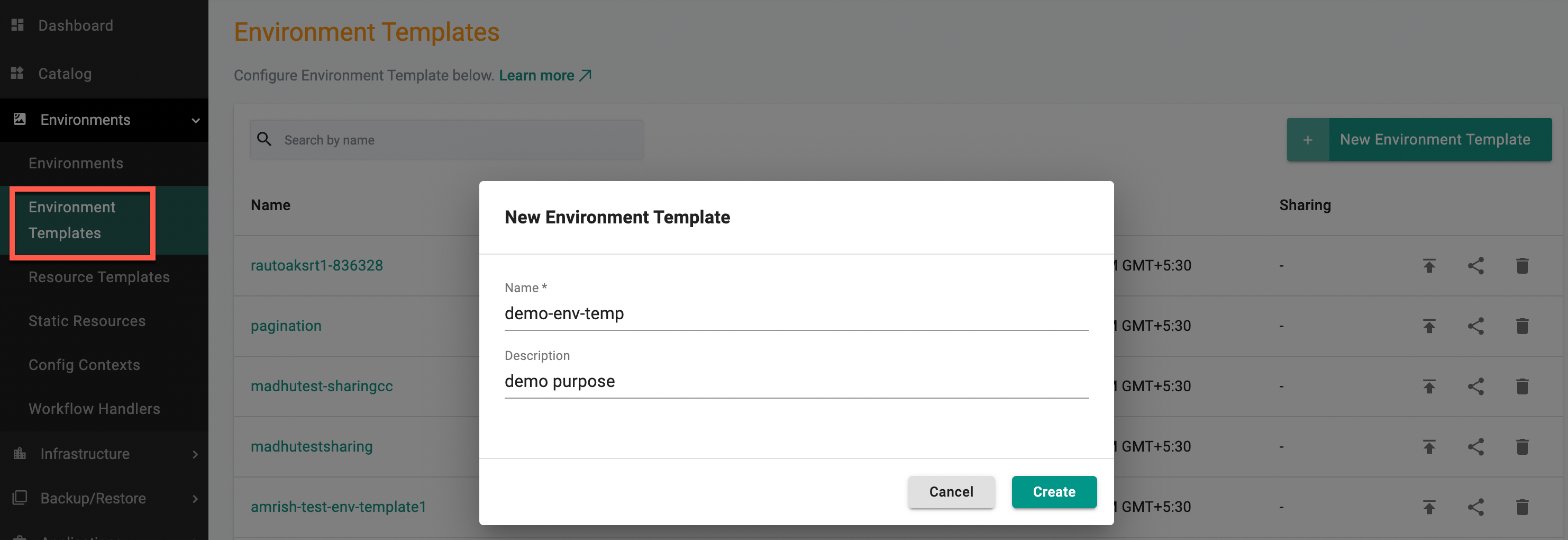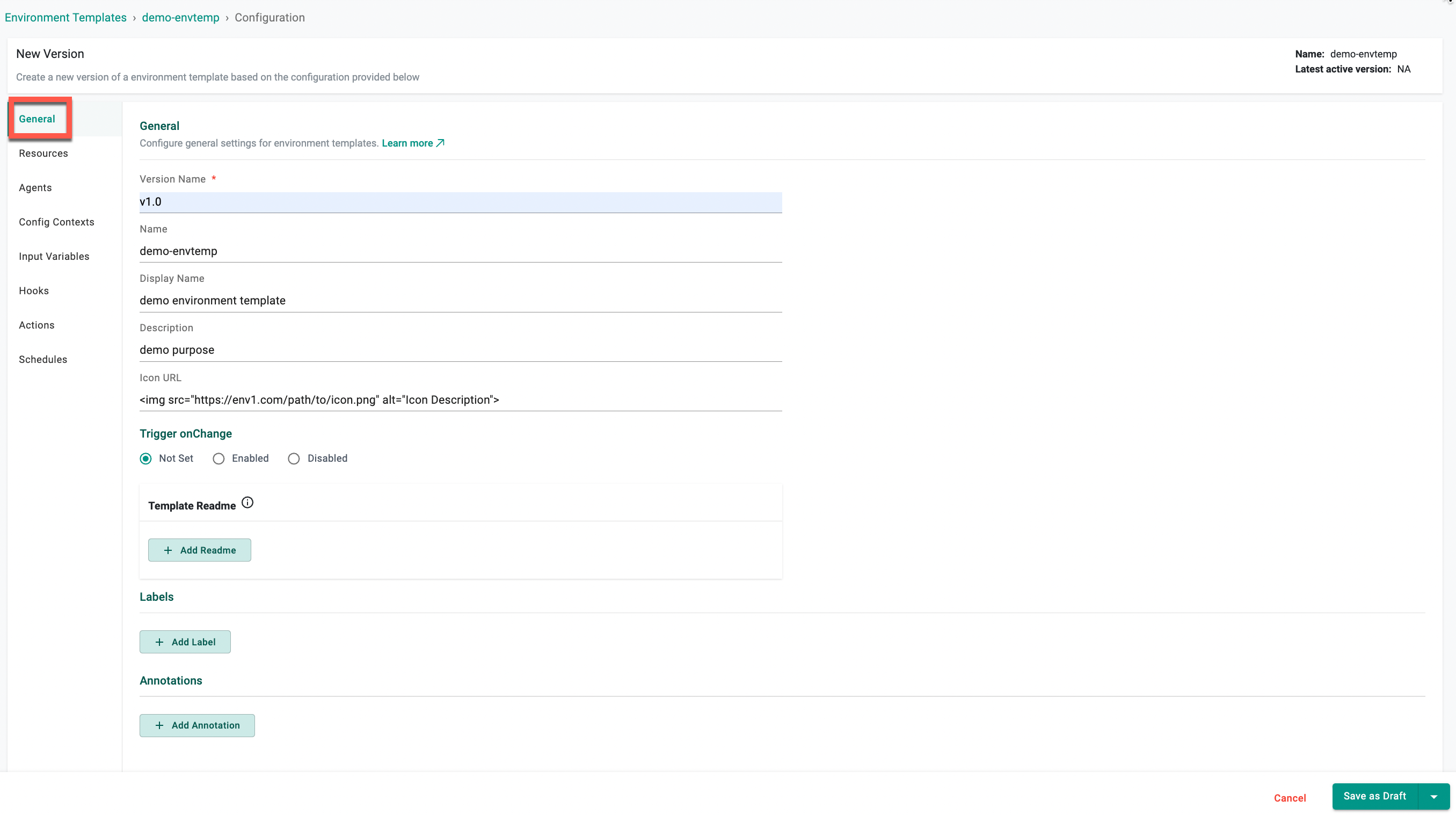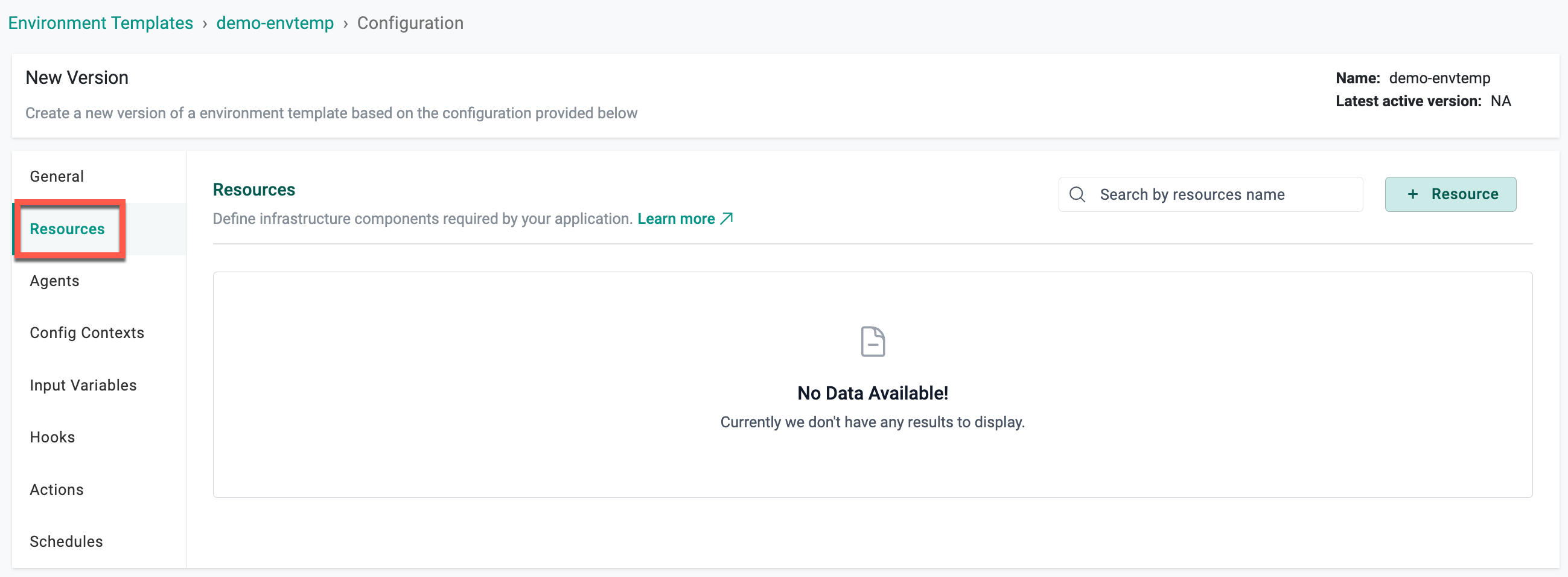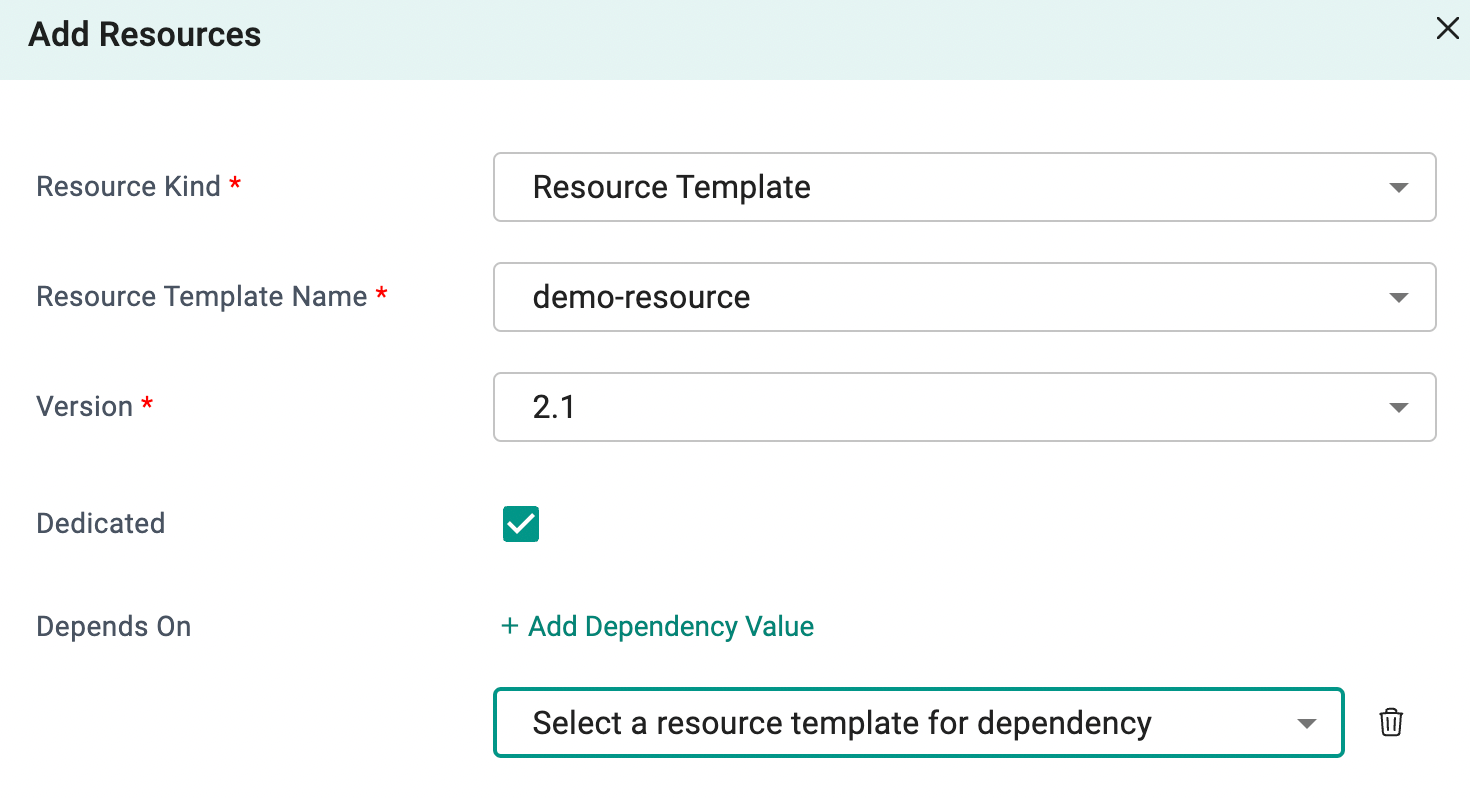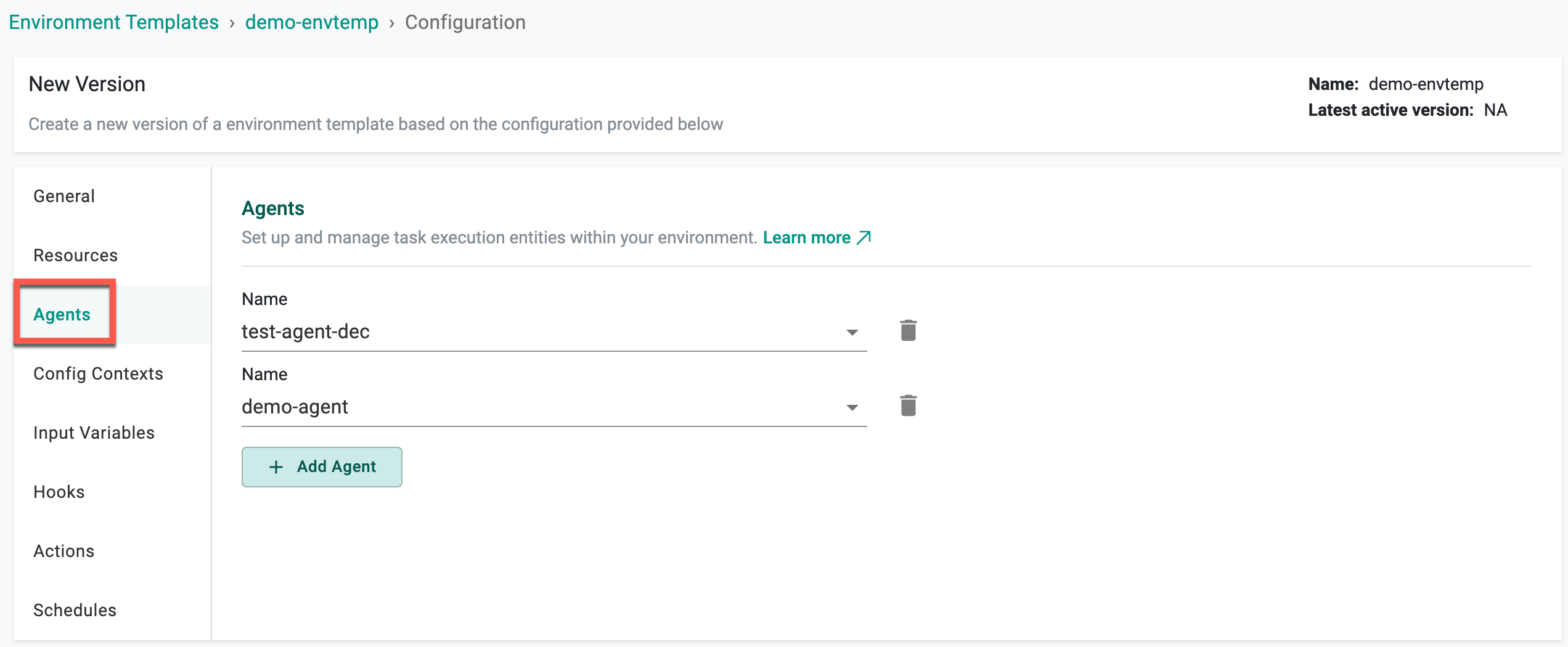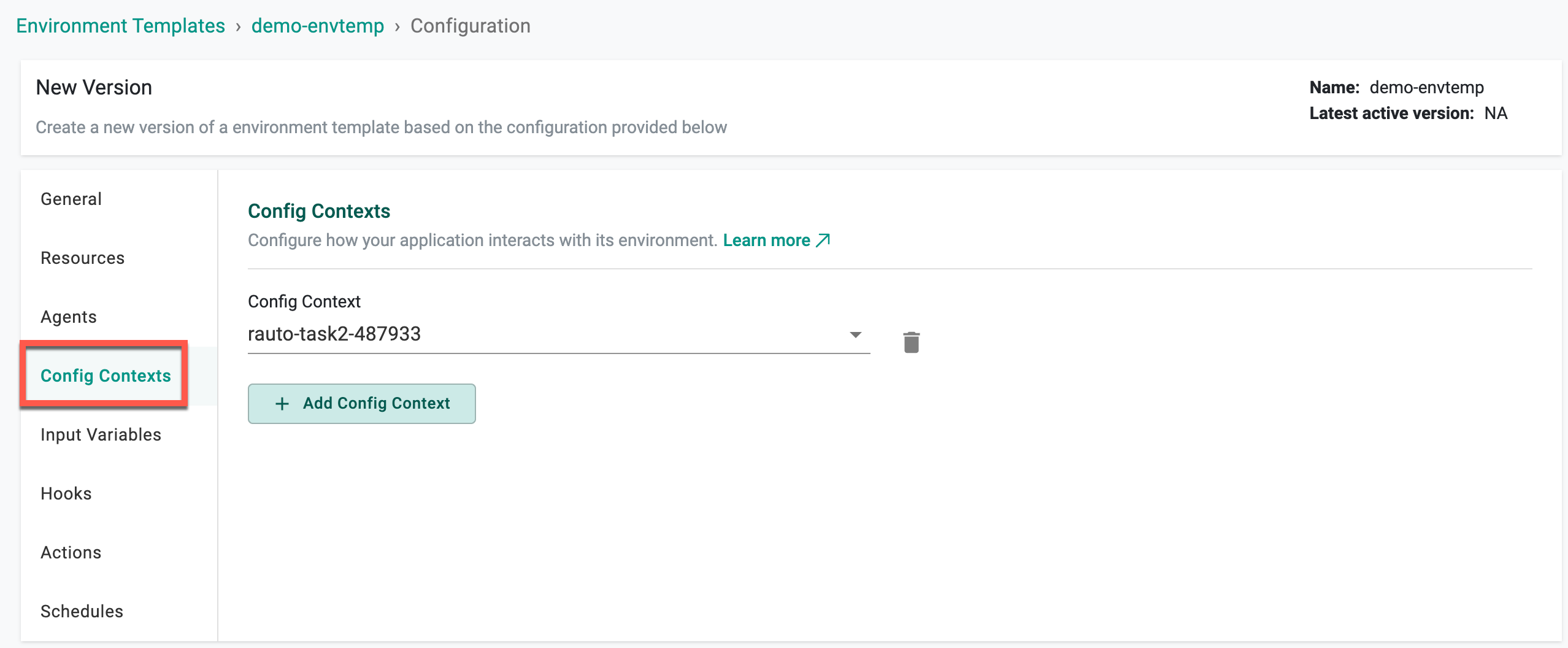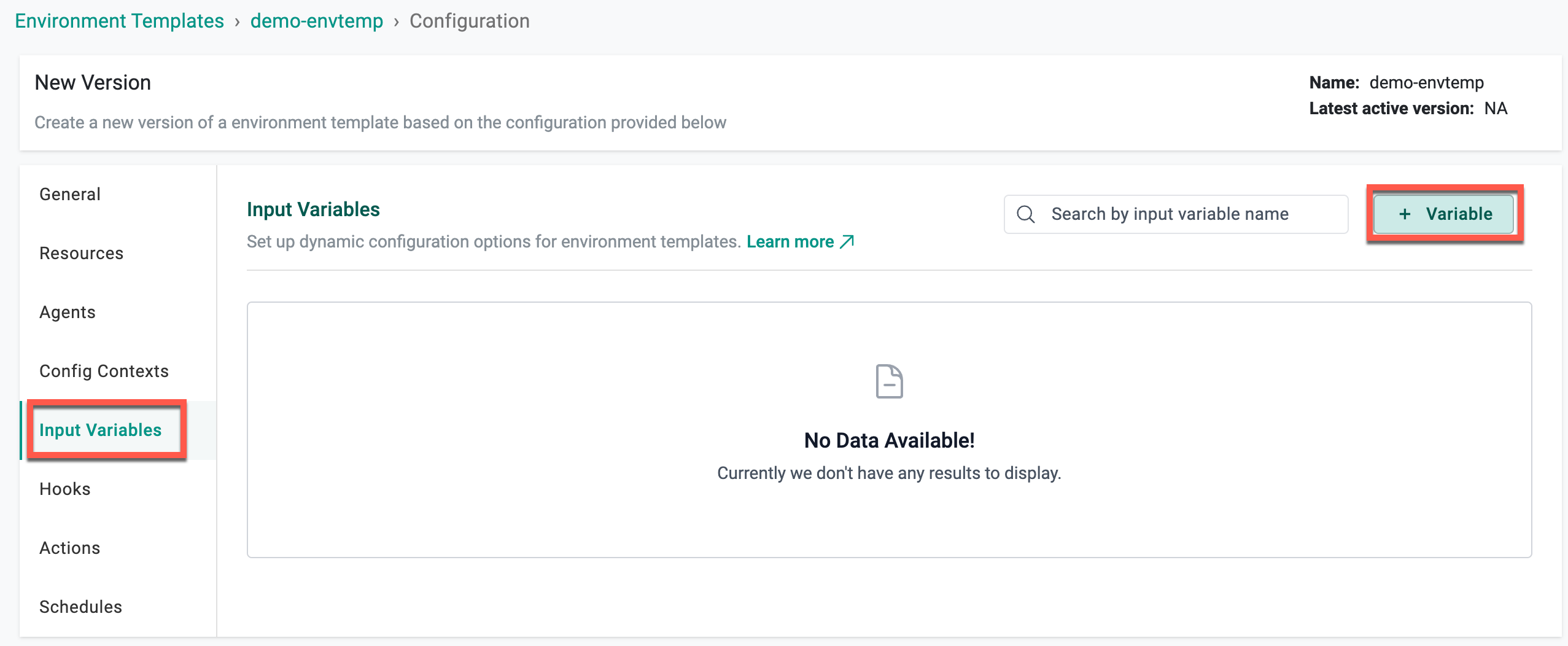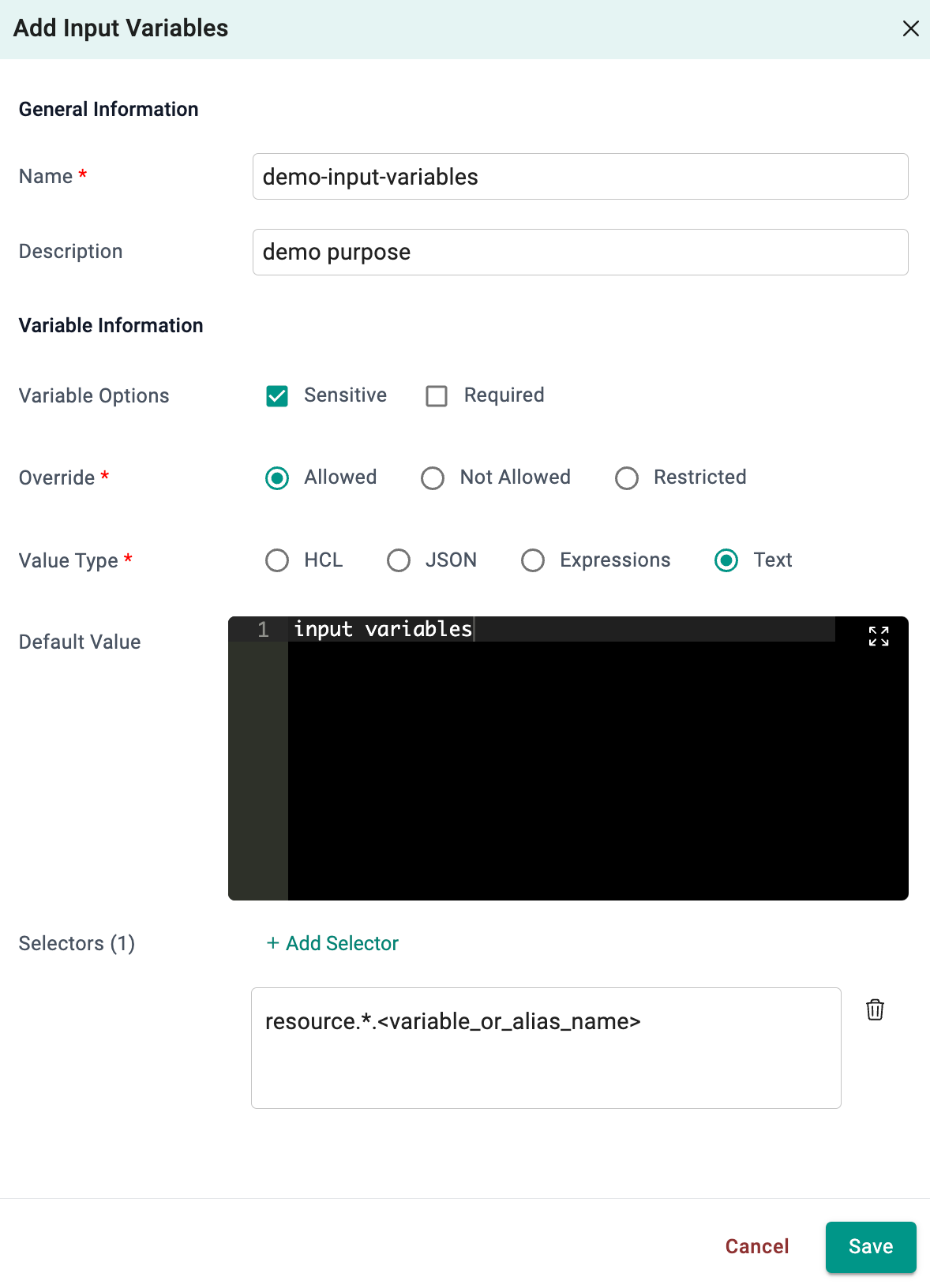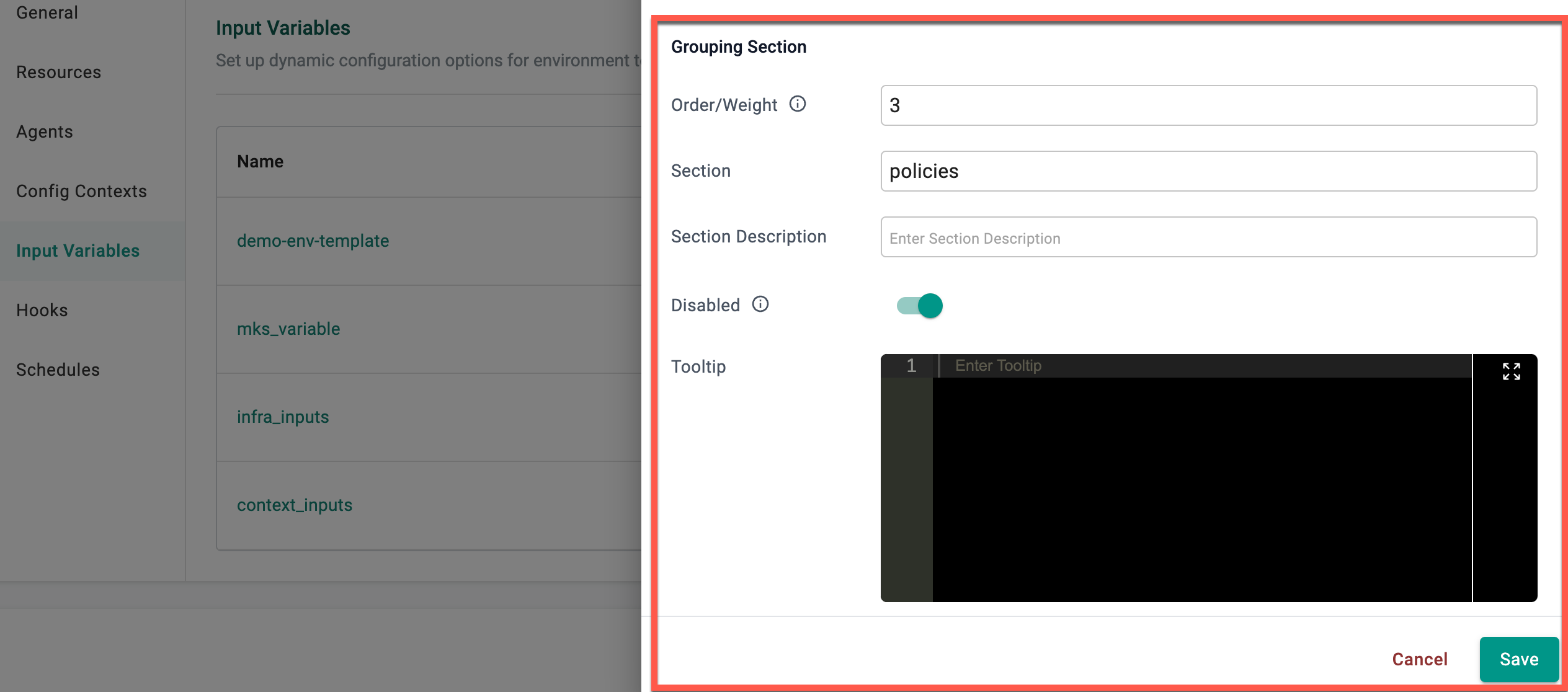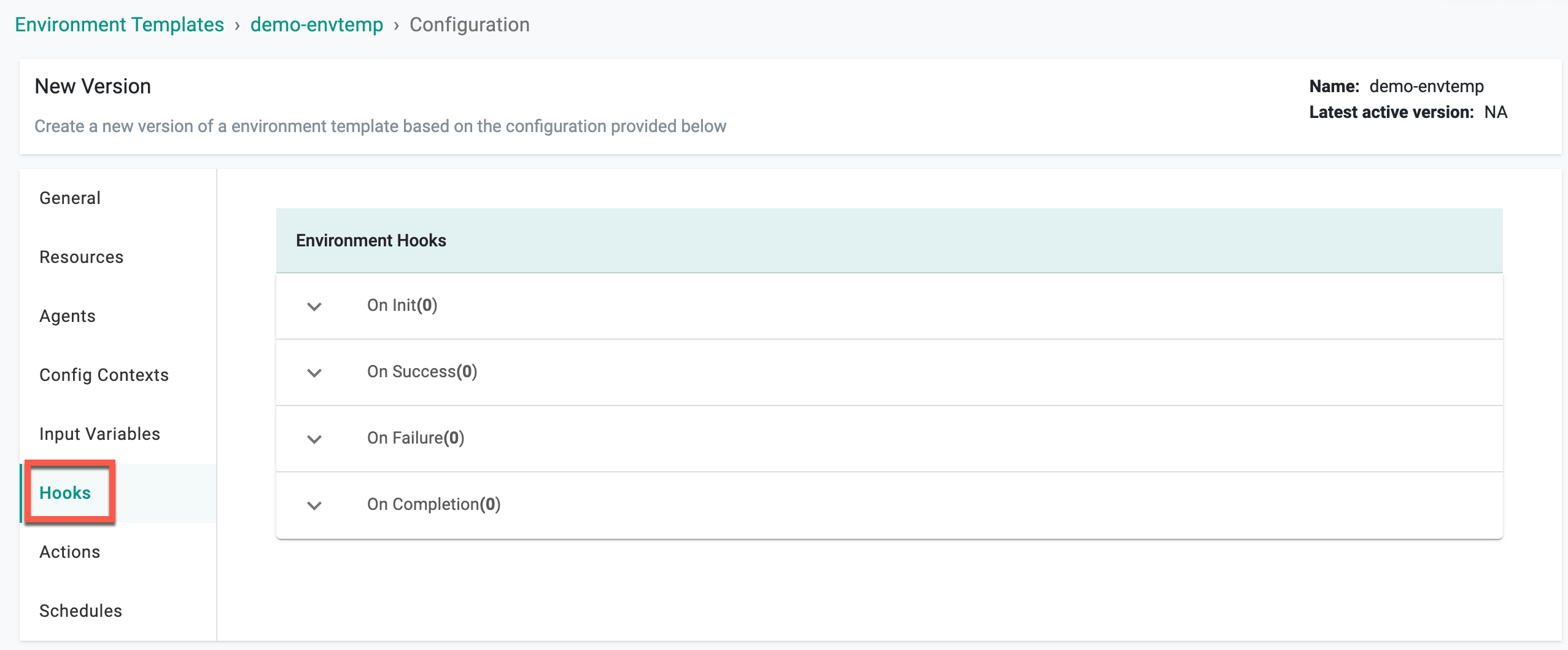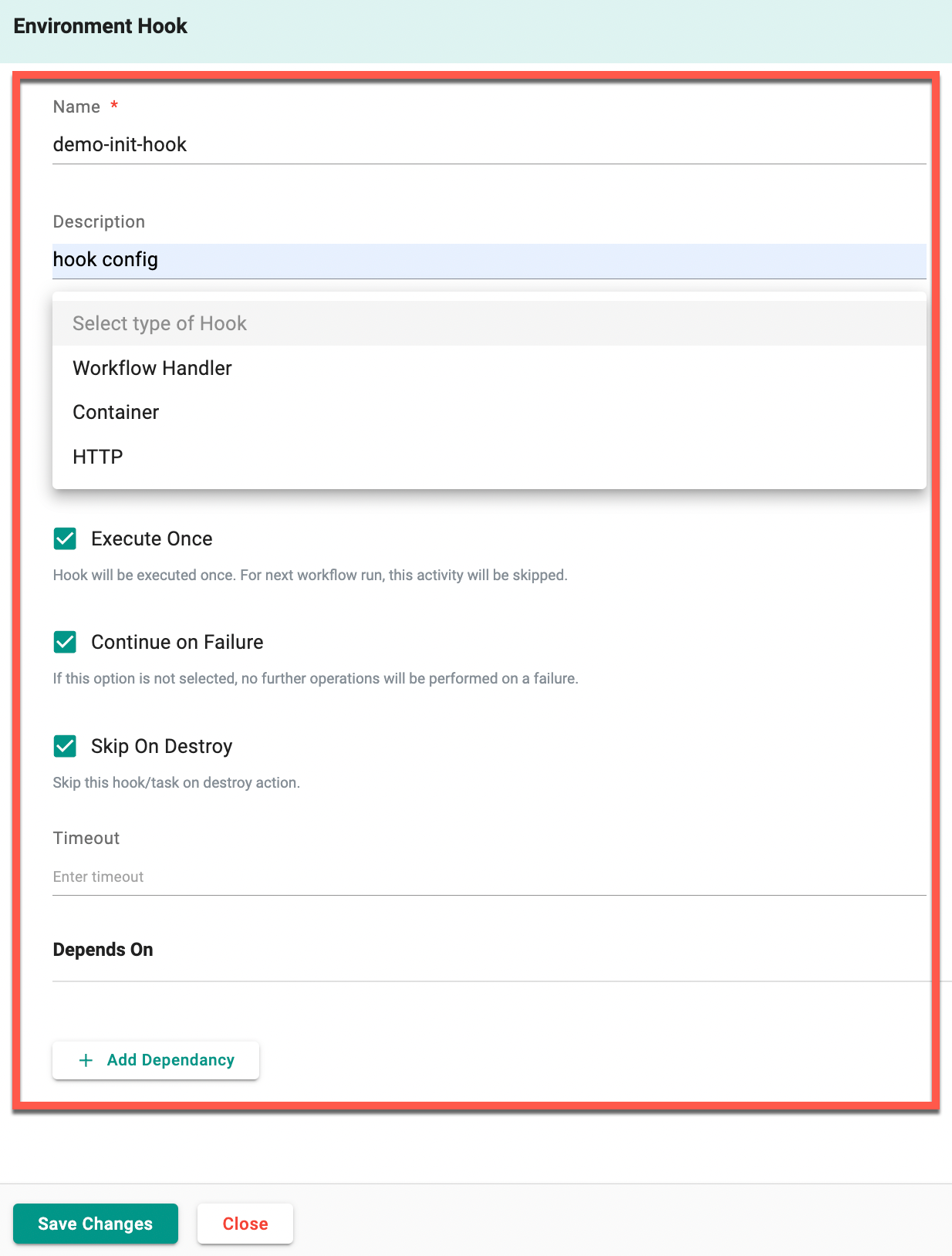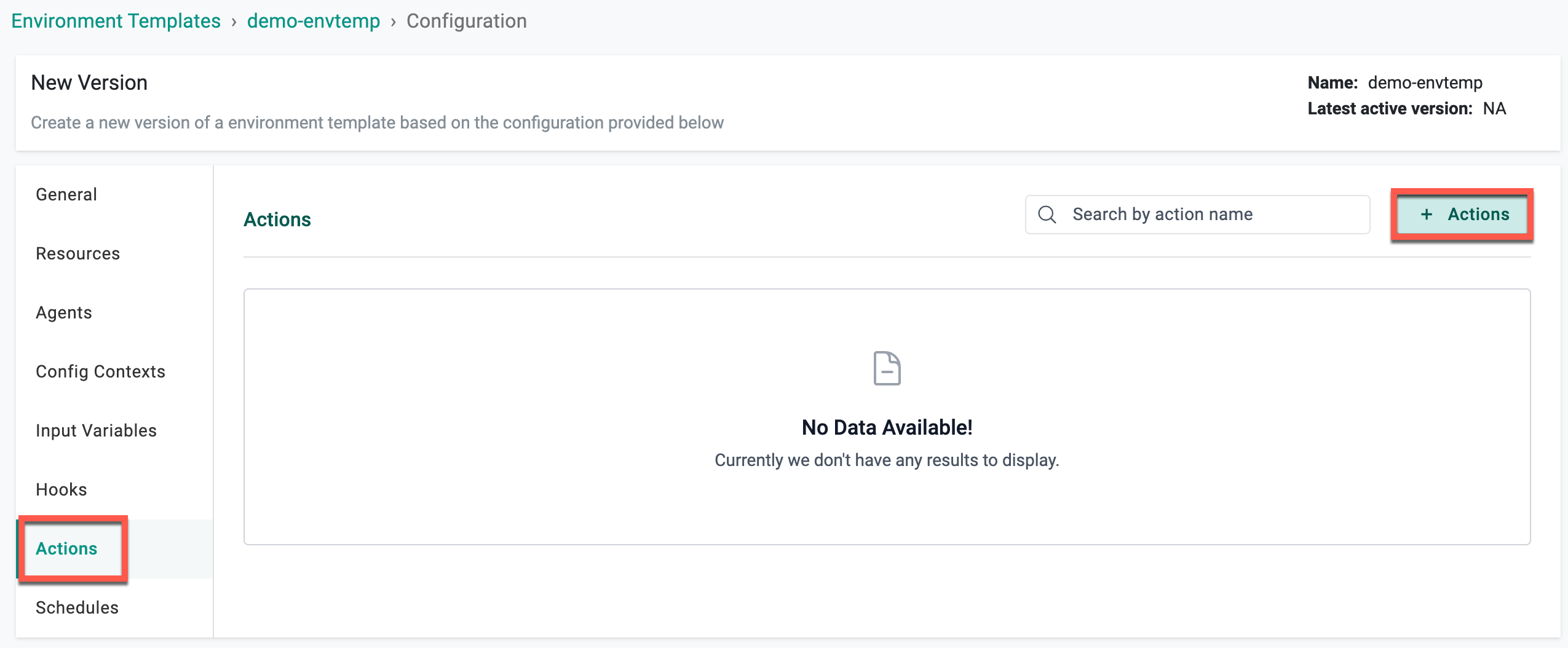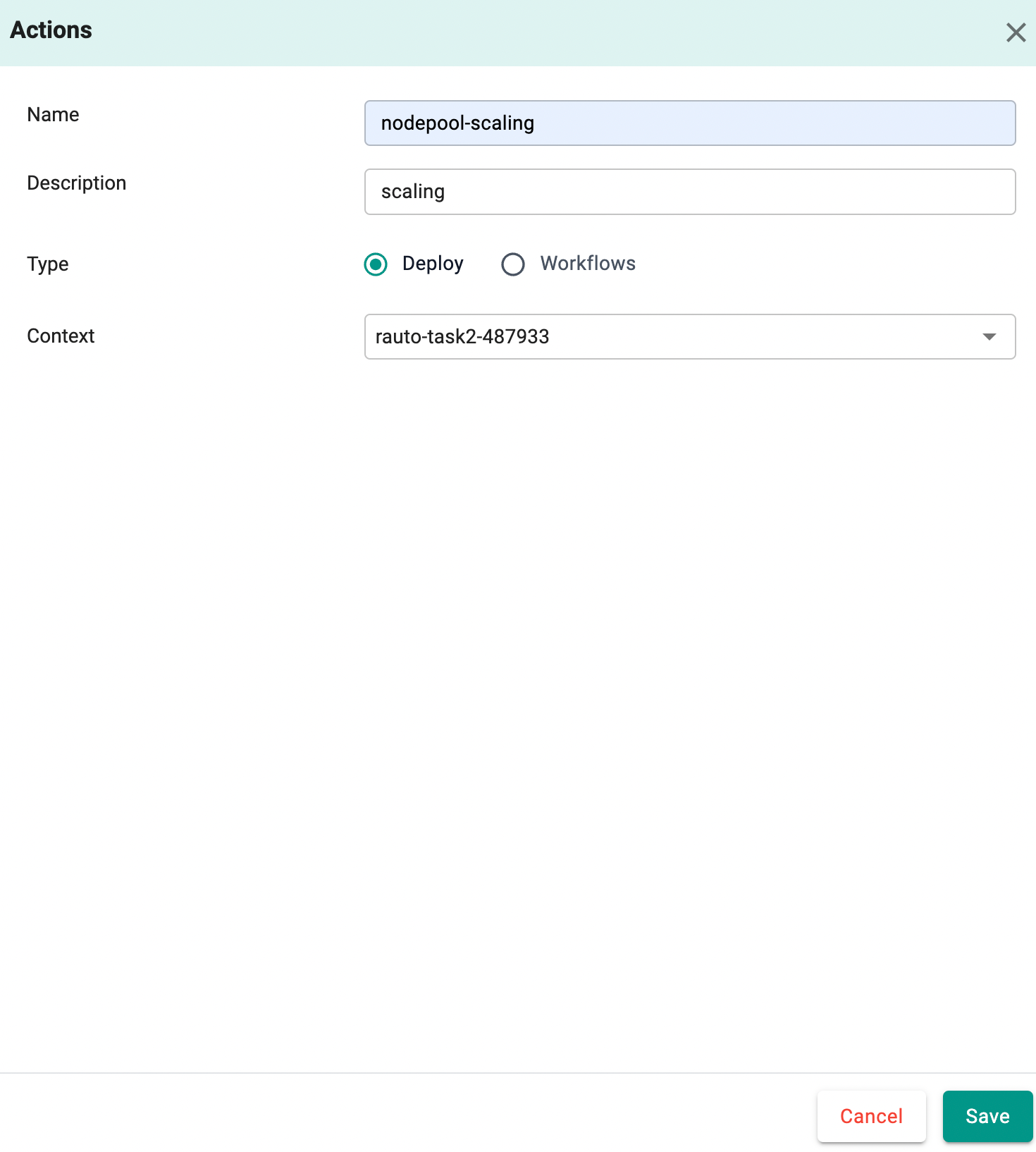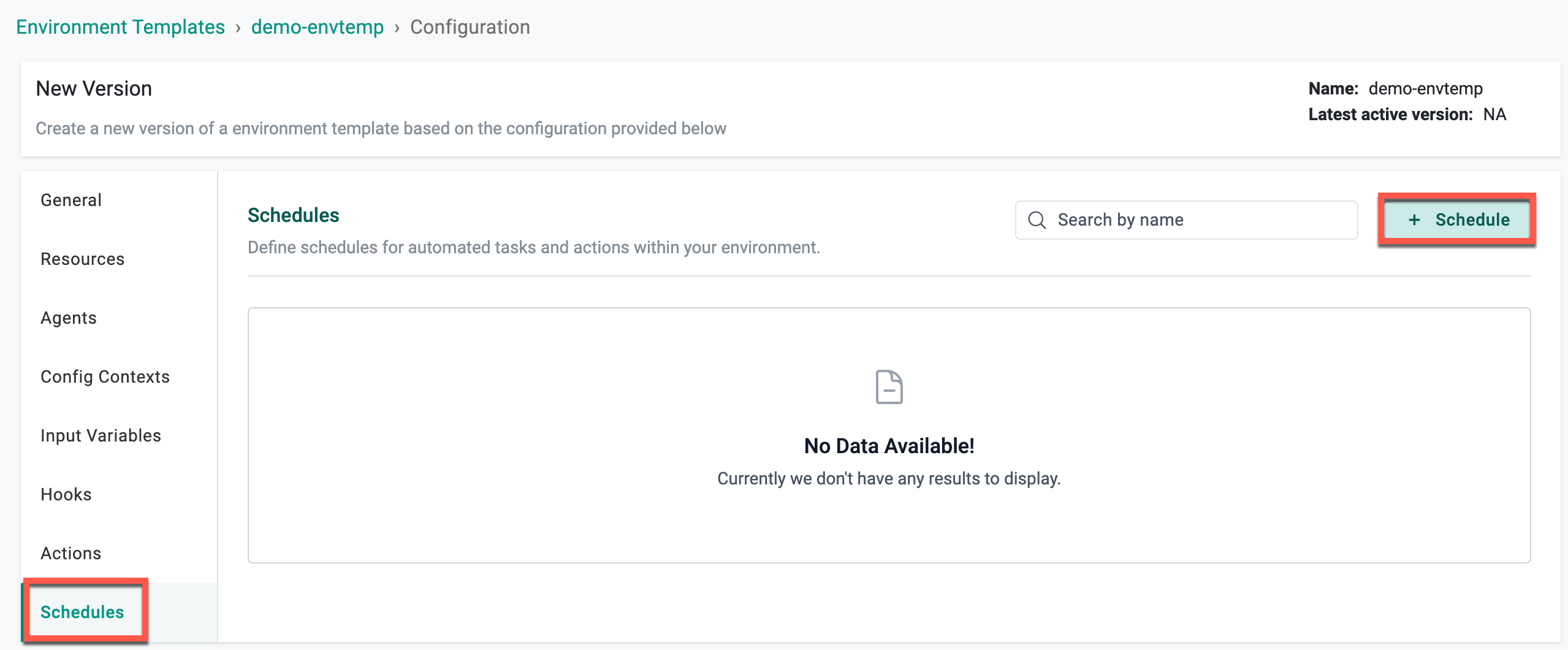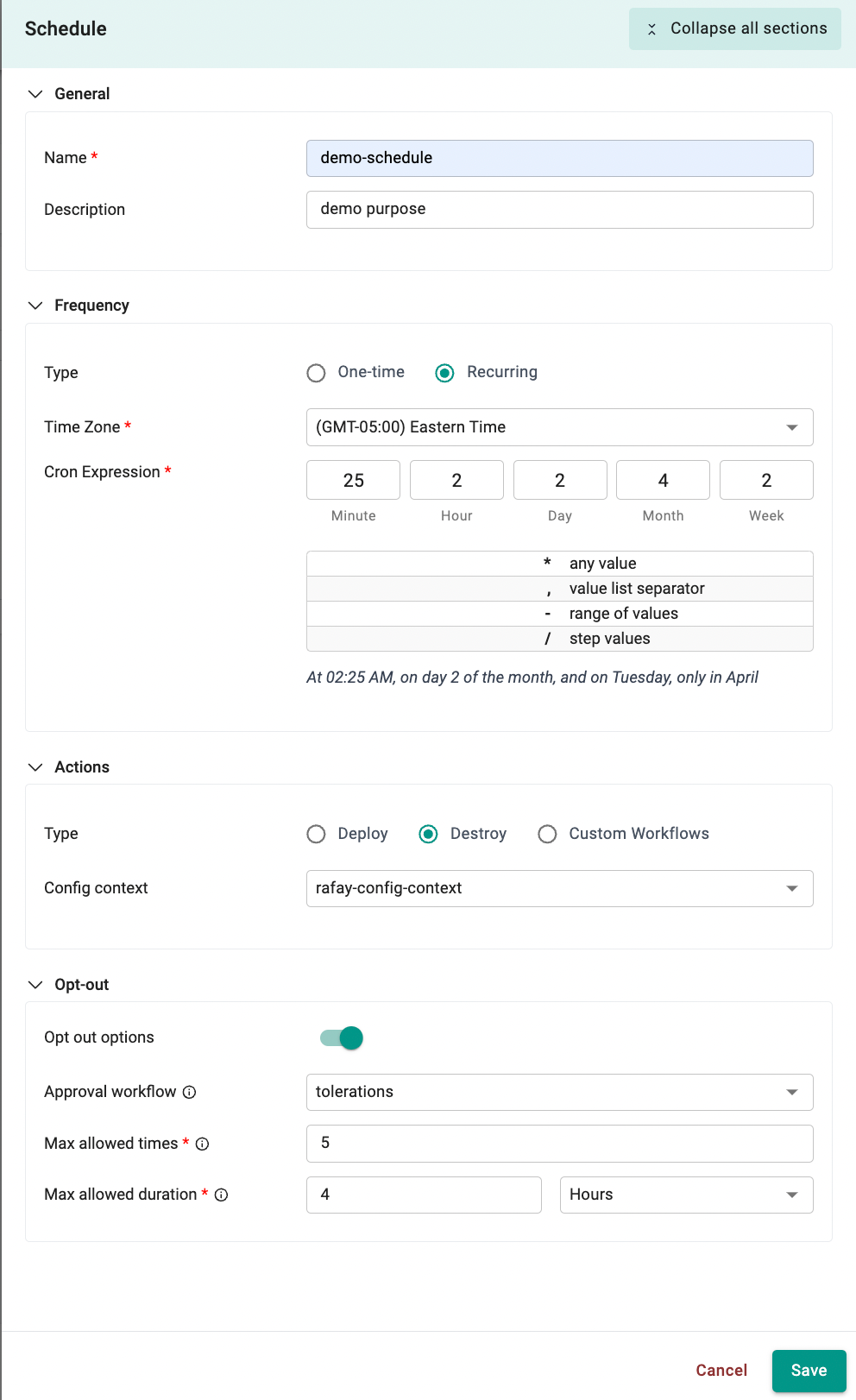Create
Environment templates are a collection of resource templates and static resources that contain environment variables, lifecycle hooks, dependencies, etc. For example, an environment template could represent a full operating environment required for a complex Kubernetes application.
Did you know ?
Environment Templates can be managed through various methods:
- UI
- CLI (RCTL)
- Terraform
- API
- GitOps
Create an Environment Template¶
- In a project, select Environments > Environment Templates
- Select New Environment Template
- Type a name for the environment template. Optionally, type a description
- See below for information about each configuration category
- Select Save to save the environment template. Click Cancel to close the configuration and go back to the environment template list
⭐ Important Note:
Org Admins can clone templates from the Template Catalog and make them available to users within the organization
General¶
The environment template new version is created and the General configuration page displays
| Setting | Description |
|---|---|
| Version Name | Enter the version for the resource. Examples: v1, 0.1, 3 |
| Name | Enter a name for the resource |
| Description | Enter a description for the resource. This is optional |
| Labels | Add a label to the resource. Use labels to specify identifying attributes of objects that are meaningful and relevant to users, but do not directly imply semantics to the core system. This is a key-value pair. For example, the key is environment and the value is dev |
| Annotations | Annotations can be added to display information such as Category and the IaC source code information for the environment template. For example, if the category of the environment template is 'Developer Productivity', use the key eaas.envmgmt.io/category and the value Developer Productivity. To display the IaC source code information, use the key eaas.envmgmt.io/github |
Resources¶
- Click + Resource to add resource(s) to this environment Template
- Select the Resource Kind. Based on the selection, user can provide the required information
Resource
| Setting | Description |
|---|---|
| Resource Name | Select an existing Resource from the drop-down |
Environment
| Setting | Description |
|---|---|
| Environment Name | Select an existing Environment from the drop-down |
Resource Template
| Setting | Description |
|---|---|
| Resource Template Name | Select an existing Resource Template from the drop-down |
| Version | Select the required Resource Template version |
| Dedicated | If the resource is dedicated, all of these resources will be created when the workload publish environment trigger is activated |
| Depends On | Adding Dependency Value ensure that the resource(s) from the added resource template are deployed first before deploying this resource |
Click Save
Note: When adding a Resource Template to an Environment Template, the resource template with System Provider can include only one cluster kind and one credential kind.
Agents¶
| Parameter | Description |
|---|---|
| Name | Select an agent to associate with this resource |
| Override Configuration | Controls if a user can change an agent or not |
| -- Allowed | Allows the user to override the agent |
| -- Not Allowed | Does not allow the user to override the agent |
| -- Restricted | Allows the users to select only specific agents from the predefined list and prevents overriding with any other agents |
| -- Required | Ensures that the agent is mandatory when creating the environment |
Config Contexts¶
| Setting | Description |
|---|---|
| Context | Select a Context to associate with this resource |
Upon furnishing the essential details, choose either Save as Active Version or Save as Draft Version
Input Variables¶
- Click + Variable to add variable(s) to this environment Template
Selectors
| Setting | Description |
|---|---|
| Name | The name of the variable |
| Description | A brief description of the variable |
| Sensitive | Does not display the value in the UI |
| Required | The variable is required when using this Context |
| Override Type | Controls if a user can change a variable or not |
| -- Allowed | Allows the user to override the value |
| -- Not Allowed | Does not allow the user to override the value |
| -- Restricted | Allows the user to override the value by selecting a different, pre-defined value |
| Restricted Values | If Restricted is selected for the Override Type, enter the values that are allowed |
| Value Type | The type of value |
| -- HCL | Hashicorp configuration language |
| -- JSON | JavaScript Object Notation (JSON) is a lightweight data-interchange format |
| -- Expressions | Expressions are valid units of code that resolve to a value |
| -- Text | Text value |
| Default Value | The variable value |
| Selectors | Selectors enable the targeting and customization of specific variables within the configuration context. Using variable selectors, users can alias existing variables or override their values. If the specified variable exists, its value is updated; if it does not exist, a new variable is created |
Grouping Information
| Setting | Description |
|---|---|
| Order/Weight | Determines the display order of the variable in the Environment Page. Lower values appear first |
| Section | Enter a name to categorize the variable |
| Section Description | Optionally, provide a brief description of the section |
| Disabled Toggle | Toggle enabled makes the variable non-editable, while disabled allows users to modify it |
| Tooltip | Add additional information to help users understand the purpose of this variable |
Hooks¶
Environment Hooks¶
| Setting | Description |
|---|---|
| On Completion | Set a hook that is triggered when resource creation or updating is complete |
| On Failure | Set a hook that is triggered when resource creation or updating fails to complete |
| On Init | Set a hook that is triggered when resource creation or updating is initialized |
| On Success | Set a hook that is triggered when resource creation or updating is successful |
Hook Types¶
When adding a Resource or Terraform hook, select a hook type and set the appropriate parameters.
Workflow Handler¶
| Setting | Description |
|---|---|
| Name | Enter a name for the Workflow Handler hook |
| Workflow Handler Configuration | |
| -- Type | Select the Workflow Handler type. Supported values are: container, http |
| Agent Name | Name of the agent responsible for execution |
| Execute Once | Enable to execute the hook once. For next workflow run, this activity will be skipped |
| Continue on Failure | Set the hook to continue execution even in case of failure |
| Skip On Destroy | Enable Skip on Destroy to prevent the execution of hooks or tasks during the destroy action, avoiding unnecessary operations |
| Skip Condition | Define rules to control task execution dynamically. The Skip Condition field enables conditional execution of tasks or hooks based on runtime parameters, ensuring that operations such as notifications, approvals, or workflow handlers are triggered only when necessary. This prevents redundant executions and improves workflow efficiency |
| Timeout | Specify the duration in the Timeout field for HTTP or Container. When a user specifies a timeout in both Hooks and Workflow Handlers, the timeout specified in Hooks takes precedence |
Container¶
| Setting | Description |
|---|---|
| Name | Enter a name for the container hook |
| Container Configuration | |
| -- cpuLimitMilli | Specify the CPU Limit to be used by the container |
| -- Image | Specify the underlying container image to be used |
| -- Memory Limit in MB | Specify the container memory limit to be set (in MB) |
| -- Working Directory Path | The working directory for commands to run in |
| -- Success Condition | Specify the success condition to be evaluated when a container completes execution |
| Arguments | Arguments to the entrypoint. The docker image's CMD is used if this is not provided |
| Commands | Entrypoint array. Not executed within a shell. The docker image's ENTRYPOINT is used if this is not provided |
| Environment Variables | Provide list of environment variables to set in the container |
| Agent Name | Name of the agent responsible for execution |
| Execute Once | Enable to execute the hook once. For next workflow run, this activity will be skipped |
| Continue on Failure | Set the hook to continue execution even in case of failure |
| Skip On Destroy | Enable Skip on Destroy to prevent the execution of hooks or tasks during the destroy action, avoiding unnecessary operations |
| Skip Condition | Define rules to control task execution dynamically. The Skip Condition field enables conditional execution of tasks or hooks based on runtime parameters, ensuring that operations such as notifications, approvals, or workflow handlers are triggered only when necessary. This prevents redundant executions and improves workflow efficiency |
| Timeout | Enter a value to set the timeout duration for container execution, if this exceeds container execution will be terminated |
HTTP¶
| Setting | Description |
|---|---|
| Name | Enter a name for the http hook |
| HTTP Configuration | |
| -- Body | Provide message body which is the data bytes transmitted during an HTTP transaction message |
| -- Endpoint | Specify the http endpoint which is a targetable URL to be invoked |
| -- Method | Specify the http method e.g. PUT, POST, GET that corresponds to the endpoint provided |
| -- Success Condition | Specify the success condition to be evaluated when a http call completes execution |
| Headers | Specify additional context and metadata about the request |
| Agent Name | Name of the agent responsible for execution |
| Execute Once | Enable to execute the hook once. For next workflow run, this activity will be skipped |
| Continue on Failure | Set the hook to continue execution even in case of failure |
| Skip On Destroy | Enable Skip on Destroy to prevent the execution of hooks or tasks during the destroy action, avoiding unnecessary operations |
| Skip Condition | Define rules to control task execution dynamically. The Skip Condition field enables conditional execution of tasks or hooks based on runtime parameters, ensuring that operations such as notifications, approvals, or workflow handlers are triggered only when necessary. This prevents redundant executions and improves workflow efficiency |
| Timeout | Enter a value to set the timeout duration for http call, if this exceeds execution will be terminated |
Actions¶
Click + Actions to add the required actions to this environment template.
🔗 Refer this page to know more about the Actions.
Admins can configure actions such as scaling node pools or modifying virtual machine settings directly within the Environment Template. These actions streamline essential tasks, support input validation, and enable auditing for efficient and accountable environment management.
| Setting | Description |
|---|---|
| Name | Name of the action |
| Description | A brief description of the action |
| Type | Select the action type: Deploy for provisioning resources or Workflows for automating tasks within the environment |
| Context | Select the required context that includes the actions |
Upon furnishing the essential details, choose either Save as Active Version or Save as Draft Version
Schedules¶
- Click + Schedule to configure tasks such as deployments, resource destruction, or workflows within an environment template.
| Setting | Description |
|---|---|
| Name | Enter the name of the scheduled task |
| Description | Provide a description of the task for more context |
| Frequency | Define when and how frequently the action will run |
| -- Type | - One-time: Executes the task only once at a specified time - Recurring: Allows setting up a recurring schedule using a cron expression |
| -- Time Zone | Select the time zone from the drop-down where the schedule will operate. By default, it is set to 'UTC', but it can be changed if needed |
| -- Cron Expression | Specify timing using a cron expression (Minute, Hour, Day, Month, Week) for fine-grained control over task scheduling - *: Represents any value - ,: Lists values - -: Represents a range of values - /: Represents step values |
| Actions | Configure the type of actions to be taken as part of the schedule - Deploy: Schedule a deployment - Destroy: Schedule the destruction of the environment - Custom Workflow: Schedule a workflow execution |
| Config context | Select an existing configuration context from drop-down, which determines the parameters under which the selected action will run |
| Opt-Out | Enabling the opt-out option allows delaying a scheduled job for a specified duration. The configuration includes setting the maximum allowed delay duration and the number of times a delay can be applied. Once these limits are reached, the scheduled task will proceed as configured |
Refer to Schedules for more information
Version Management¶
Upon saving the configurations, users have the ability to review the list of environment templates with versions. To delve into specific version details, click on the corresponding version number.
There are three (3) distinct states for environment template versions:
- Draft
- Active
- Disabled
Users can create a draft version of environment templates and make multiple edits to it during the testing/validation phase. Once it is verified that the template is working as expected, users can transition the status from Draft to Active. However, it's important to note that no further edits can be made to the template in the active status. A new version has to be created for any edits to an Active version. Draft versions are project scoped which means that these versions are not shared with downstream projects (when the template is shared).
If a version of a template needs to be made unavailable for security related reasons or compliance, users can disable it by clicking on the Disable icon. Disabling effectively restricts further use of this version, meaning it can no longer be referenced in any new environments that are created. However, existing environments already using this version will remain unaffected.
Draft Status¶
In the draft status, the following rules apply:
- Inaccessible from shared projects
- Usable within the same project
- Editable multiple times
- Can be marked as active (accessible from shared projects)
- Can be marked as disabled and restored to an active state by enabling
Active Status¶
For versions in the active status:
- Cannot be reverted back to draft from any other state
- Accessible from shared projects
- No further changes allowed
- Can be marked as disabled and restored to an active state by enabling
Disabled Status¶
Versions in the disabled status adhere to the following rules:
- Cannot be used in the future; no impact on existing projects
- Can be restored to an active state by enabling
Important
- Use the delete icon to remove a version if it is not currently in use. Versions cannot be deleted if they are in use
- Environment Template versions can be managed through different interfaces, including UI, Terraform, and GitOps Sync
